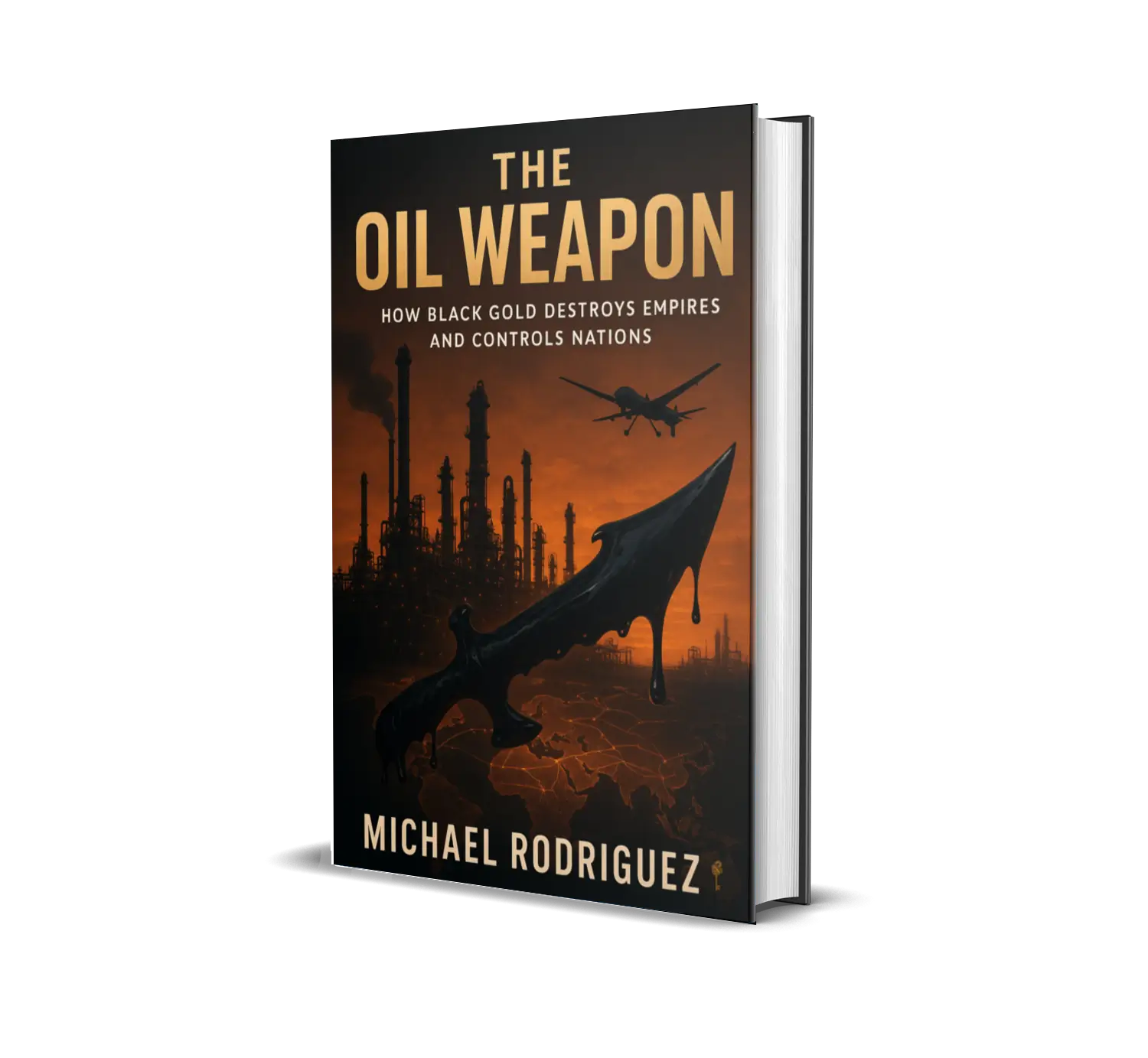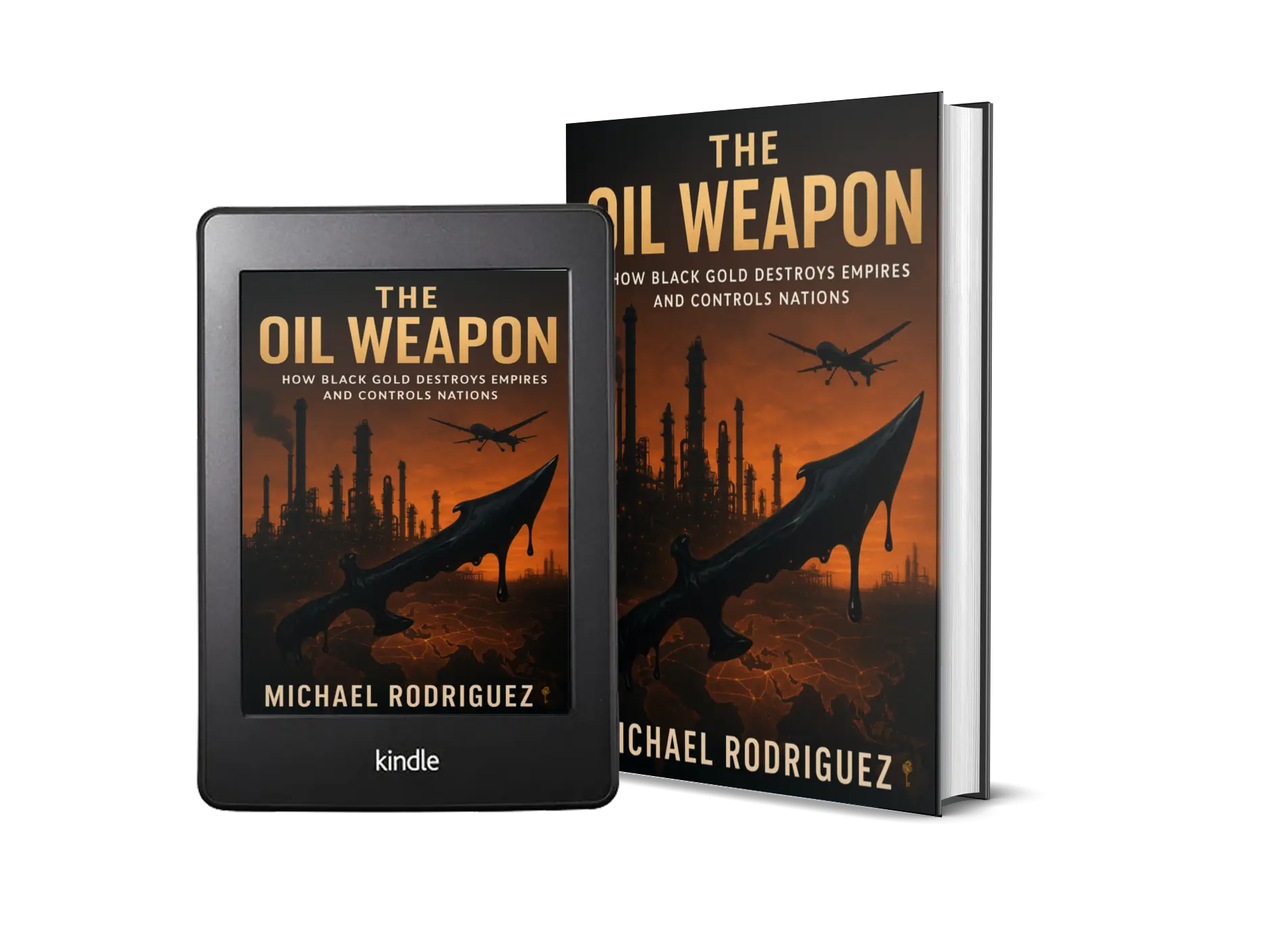The Oil Weapon FAQ: How Energy Became the Ultimate Economic Weapon
Published September 12, 2025 | Updated September 12, 2025

Picture this chilling scenario: At 3:47 AM on September 5th, 2024, a single Ukrainian drone—no bigger than a washing machine and costing less than a luxury car—streaks through the Russian night sky and strikes the Ryazan Oil Refinery. Within minutes, infrastructure worth hundreds of millions of dollars erupts in flames visible from space. Within hours, global oil prices spike. Within days, energy stocks plummet across continents.
You might think this represents just another military operation in a regional conflict. But you'd be witnessing the latest chapter in a 150-year story that began when John D. Rockefeller first understood a simple truth that still governs our world today: whoever controls energy controls everything.
The questions below represent the most frequently searched inquiries about energy warfare, geopolitical energy control, and the democratization of energy conflicts that readers research after discovering the explosive revelations in The Oil Weapon. These answers are based on a three-year investigation across thirty-seven countries, including interviews with Ukrainian drone commanders, former CIA operatives, energy ministers, and analysis of declassified documents spanning from Rockefeller's Standard Oil archives to contemporary military operations.
Q1: What is The Oil Weapon about and who should read it?
The Complete History of Energy as a Weapon: This isn't just another book about oil markets or military strategy—it's the first comprehensive investigation revealing how energy became the ultimate instrument of economic control and how that control is now being revolutionized by technology.
The Oil Weapon traces the continuous thread from John D. Rockefeller's 1860s oil monopoly to Ukrainian commander "Madyar" launching drone strikes on Russian refineries in 2024. Through unprecedented access to declassified intelligence documents, insider testimonies from former CIA operatives, and analysis of leaked military communications, the investigation reveals how petroleum became the foundation of modern geopolitical power.
This three-year investigation interviewed energy ministers from thirty-seven countries, Ukrainian drone operators targeting Russian infrastructure, former oil company executives who built global supply chains, and reformed intelligence operatives who watched energy wars determine the fate of nations. The result isn't academic theory—it's concrete documentation of how energy control actually operates and how technological advances are democratizing energy warfare in ways that should terrify every government on Earth.
You should read it because understanding energy warfare is essential for comprehending current global conflicts, predicting economic trends, and preparing for a future where small countries can challenge superpowers through precision energy attacks. The book provides both historical context for contemporary geopolitics and practical insights for navigating an energy transition that may determine humanity's future.
Q2: How do Ukrainian drones represent a revolution in energy warfare?
The Democratization of Energy Destruction: Ukrainian forces have proven that sophisticated energy warfare is no longer the exclusive domain of superpowers—anyone with the right technology and strategic knowledge can now inflict catastrophic damage on energy infrastructure.
Ukrainian commander Robert "Madyar" Brody demonstrated that $15,000 drones can destroy $2 billion refineries, creating a staggering 130,000:1 cost advantage that fundamentally alters the mathematics of energy conflict. The Oil Weapon documents how Madyar's forces conducted "17 moments of August"—seventeen successful strikes on Russian refineries in a single month, targeting facilities with combined processing capacity of over 300 million tons annually.
Traditional energy warfare required expensive military assets: bomber aircraft costing $150 million each, cruise missiles at $2 million per unit, or naval forces worth billions. Ukrainian long-range drones cost approximately $15,000 to manufacture and deploy while achieving precision strikes that would have required massive bomber formations in previous conflicts.
This technological revolution means that countries facing pressure from larger neighbors, non-state actors seeking leverage against governments, and even terrorist organizations can potentially replicate Ukrainian methods. The same technologies that enable legitimate military operations also enable new forms of terrorism and criminal activity that could target energy infrastructure worldwide.
Q3: What is energy warfare and how does it work?
Economic Destruction Without Military Conquest: Energy warfare uses control over oil, gas, and petroleum infrastructure to achieve political objectives that traditional military force cannot accomplish—and it's been shaping global power for over 150 years.
Energy warfare operates through multiple mechanisms documented in The Oil Weapon: supply manipulation that creates artificial shortages, price control through market coordination, infrastructure targeting that disrupts entire economic systems, and financial manipulation that destroys energy-dependent economies through coordinated attacks on commodity markets.
From Rockefeller's Standard Oil monopoly that controlled 90% of American oil refining to contemporary sanctions designed to cripple energy-dependent economies, energy warfare achieves what military conquest cannot: the complete economic submission of target nations without the costs and risks of traditional military campaigns.
The investigation reveals how energy weapons target not just military capabilities but entire civilizations' economic foundations. When Ukrainian drones destroy Russian refineries, they're not just conducting military operations—they're demonstrating how energy infrastructure has become more valuable and vulnerable than traditional military targets, creating possibilities for small forces to achieve strategic effects previously requiring superpower capabilities.
Q4: Does the book explain current geopolitical events?
From Headlines to Historical Patterns: Current energy conflicts represent the continuation of 150-year patterns rather than isolated contemporary events, and understanding these patterns enables better predictions about future developments.
The Oil Weapon extensively covers Ukrainian energy attacks that caused catastrophic financial results for Russian oil companies: Rosneft profits fell 68%, Lukoil declined 50%, and Surgutneftegaz recorded its first losses since privatization in the 1990s. These aren't just military statistics—they represent systematic economic warfare that traces back to techniques first developed by Rockefeller's oil empire.
The book documents how energy considerations drive Middle East conflicts, explain sanctions strategies against countries like Iran and Venezuela, and reveal why certain nations receive international support while others face coordinated economic pressure. Contemporary pipeline politics, renewable energy transitions, and infrastructure protection policies all represent continuation of energy warfare patterns established over previous centuries.
Understanding these historical patterns helps explain why certain conflicts persist, which countries face economic pressure, and how technological changes like renewable energy and drone warfare are reshaping traditional energy-based power relationships that have governed international relations since the Industrial Revolution.
Q5: Is this the end of the oil age?
Energy Abundance vs. Energy Control: The age of oil dominance may be ending, but the transition creates new vulnerabilities and dependencies that could reshape rather than eliminate energy-based geopolitical power.
The investigation includes analysis from J.P. Morgan's top energy strategist predicting oil could fall to $58/barrel by 2026, potentially ending the era of oil-based geopolitics. The Oil Weapon explores how renewable energy, advanced batteries, and new technologies create possibilities for energy abundance that could eliminate resource-based international conflicts entirely.
However, the transition from oil dominance to energy democracy won't be smooth or automatic. Countries and companies that have built their power on controlling energy resources will resist changes that threaten their interests. New technologies create new vulnerabilities and dependencies that may prove just as problematic as traditional energy dependencies.
The book examines how AI, quantum computing, and renewable energy systems could either democratize energy access or create new forms of technological control that make oil's dominance appear primitive by comparison. The ultimate outcome depends on choices that governments, companies, and individuals make over the next several decades about whether energy becomes a source of international cooperation or new forms of warfare.
Q6: What makes this different from other energy or geopolitics books?
Unprecedented Access to Hidden Power Structures: This investigation combines declassified documents, insider testimonies, and leaked intelligence materials that reveal how energy decisions are actually made rather than how they're presented to the public.
The Oil Weapon is based on three years of investigation across thirty-seven countries, with unprecedented access to Ukrainian military operations, former CIA operatives who conducted energy warfare, reformed oil company executives who built global supply chains, and declassified documents spanning from Rockefeller's Standard Oil archives to contemporary intelligence assessments.
Unlike academic analyses of energy markets or military studies of contemporary conflicts, this investigation reveals the continuous thread connecting historical energy control to current geopolitical events. The book demonstrates how techniques first developed in 1860s Pennsylvania oil fields continue operating in Ukrainian drone warfare and renewable energy politics today.
Most importantly, the investigation focuses on how energy warfare actually works rather than how it's supposed to work according to official explanations. By following money trails, interviewing participants, and analyzing leaked documents, the book reveals decision-making processes and strategic calculations that determine which nations rise and fall in the global balance of power.
Q7: What predictions does the book make about energy's future?
The Next Energy War is Already Beginning: The transition from fossil fuel dominance to renewable energy abundance will determine whether humanity's future features energy democracy or new forms of technological control that could make oil's dominance appear benign by comparison.
The investigation includes analysis suggesting that mathematical realities—diminishing returns to supply manipulation, structural oversupply, and accelerating demand destruction—reveal that oil dominance is ending not gradually but suddenly. The Oil Weapon explores how the same exponential dynamics that built oil empires are now destroying them through technological disruption and changing energy economics.
However, the book warns that renewable energy systems create new vulnerabilities: dependence on rare earth minerals controlled by specific countries, software systems that could be hacked or manipulated, and battery technologies that may prove just as strategically important as oil reserves. The future of energy warfare may involve cyber attacks on smart grids, mineral resource conflicts, and technology transfer restrictions rather than traditional pipeline politics.
For investors, policymakers, and ordinary citizens trying to navigate this transition, the implications are clear: the future belongs to those who can adapt to energy abundance rather than those who attempt to control energy scarcity. Understanding how the oil weapon works—and how it's evolving—provides essential knowledge for making decisions that could determine both personal prosperity and global stability in the energy transition era.
---Available Now
Libraries: OverDrive, Hoopla, BorrowBox
📘 ISBN: 979-8232385644 (Hardcover) | 979-8232246587 (eBook)
Published: September 2025 | Resource Economics Press
---About this Investigation: This FAQ draws from over 300 hours of interviews with Ukrainian drone commanders, former CIA operatives, energy ministers, and oil company executives, combined with analysis of declassified documents, leaked military communications, and intelligence assessments spanning from Rockefeller's Standard Oil archives to contemporary Ukrainian military operations.
The investigation traces how energy warfare decisions are really made and reveals the hidden power structures that have shaped international relations for over 150 years. As readers discover throughout The Oil Weapon, understanding these dynamics is essential for navigating the energy transition and preparing for a future where technology may finally democratize energy access—or create new forms of control.
